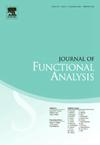Martingale suitable weak solutions of 3-D stochastic Navier-Stokes equations with vorticity bounds
IF 1.6
2区 数学
Q1 MATHEMATICS
引用次数: 0
Abstract
We construct martingale suitable weak solutions for 3-dimensional incompressible stochastic Navier-Stokes equations with generally non-linear noise. In deterministic setting, as widely known, “suitable weak solutions” are Leray-Hopf weak solutions enjoying two different types of local energy inequalities (LEIs). In stochastic setting, we apply the idea of “martingale solution”, avoid transforming to random system, and show new stochastic versions of the two local energy inequalities. In particular, in additive and linear multiplicative noise case, OU-processes and the exponential formulas DO NOT play a role in our formulation of LEIs. This is different to [16], [44] where the additive noise case is dealt. Also, we successfully apply the concept of “a.e. super-martingale” to describe this local energy behavior. To relate the well-known “dissipative weak solutions” come up with in [12], we derive a local energy equality and extend the concept onto stochastic setting naturally. For further regularity of solutions, we are able to bound the -norm of the vorticity and -norm of the gradient of the vorticity, in case that the initial vorticity is a finite regular signed measure.
具有涡度界的三维随机Navier-Stokes方程的鞅适弱解
构造了具有一般非线性噪声的三维不可压缩随机Navier-Stokes方程的鞅适弱解。众所周知,在确定性环境下,“合适弱解”是具有两种不同类型的局部能量不等式的Leray-Hopf弱解。在随机环境下,我们应用了“鞅解”的思想,避免了向随机系统的转换,给出了两个局部能量不等式的新的随机版本。特别是,在加性和线性乘法噪声情况下,ou过程和指数公式在我们的lei公式中不起作用。这和[16][44]不同,[16][44]处理的是加性噪声。此外,我们成功地应用了“a.e”的概念。“超级鞅”来描述这种局部能量行为。为了将[12]中众所周知的“耗散弱解”联系起来,我们导出了一个局部能量等式,并将这个概念自然地推广到随机环境中。对于解的进一步正则性,当初始涡量是有限正则有符号测度时,我们可以对涡量的L∞([0,T];L1(Ω×T3))范数和涡量梯度的L43+δ(Ω×[0,T]×T3)范数进行约束。
本文章由计算机程序翻译,如有差异,请以英文原文为准。
求助全文
约1分钟内获得全文
求助全文
来源期刊
CiteScore
3.20
自引率
5.90%
发文量
271
审稿时长
7.5 months
期刊介绍:
The Journal of Functional Analysis presents original research papers in all scientific disciplines in which modern functional analysis plays a basic role. Articles by scientists in a variety of interdisciplinary areas are published.
Research Areas Include:
• Significant applications of functional analysis, including those to other areas of mathematics
• New developments in functional analysis
• Contributions to important problems in and challenges to functional analysis

 求助内容:
求助内容: 应助结果提醒方式:
应助结果提醒方式:


